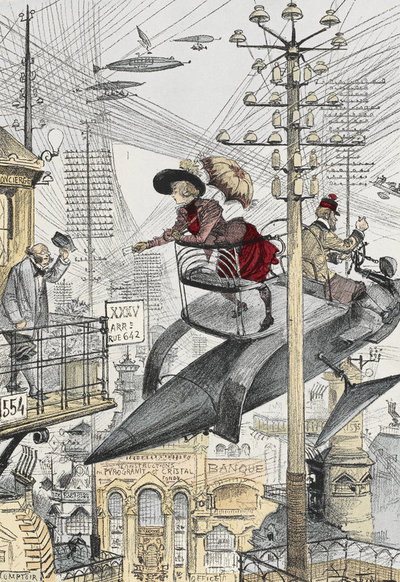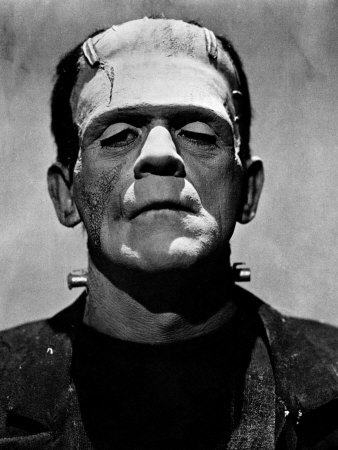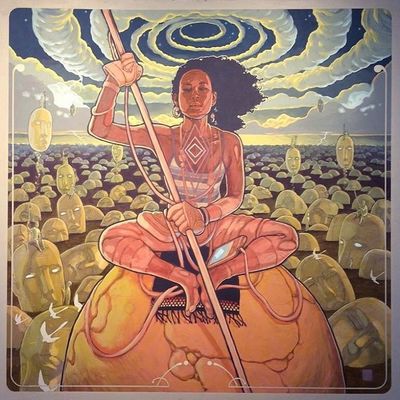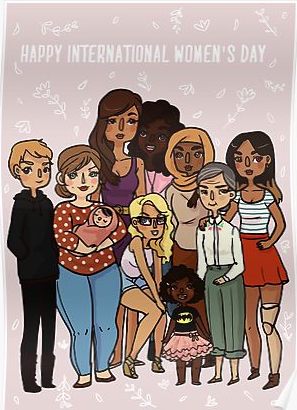1. Mary Shelley. Scifi was invented by a girl. And guess what? Frankenstein is brilliant. So if you’ve always pretended to have read it when in fact you haven’t, now’s the time.
2. Octavia Butler. If you haven’t read any Butler’s novel and you claim to be a SFF fan, then you need to either revise your claims or hurry to read one. I think the best to start discovering her work is Kindred. 3. Lois McMaster Bujold is one of my favourite writers. From space opera (and planet opera, and scifi spy mystery, etc.) with the Vorkosigan Saga to fantasy with Chalion, she has written for every taste and Paladin of Souls is also one of my favourite book ever. 4. Nalo Hopkinson. It’s a crime how little known she is when in fact her prose is one of the most amazing out there at the moment, and some of her books combine remarkable inventiveness with gut punching stories. 5. Aliette de Bodard is much beloved by her fans and for good reasons. Among her many stories, my favourite is the Xuya series, a space opera series set in a Confucian galactic empire, with sentient ships and family duty. 6. Charlie Jane Anders has written All the Birds in the Sky, a story that combines scifi and fantasy, with romance and mystery at the heart of it. 7. Connie Willis has written my go-to story when I feel a bit blue or a bit meh. To Say Nothing of the dog has time travel, eccentric Oxford dons, mischievous cats, perfect butlers, to say nothing of the dog. 8. Kameron Hurley is a scifi writer. Her novel The Stars are Legion is a space opera with only female characters, a space mystery and a ruthless power struggle. 9. Leigh Brackett, because, yes, there were women writers during the Golden Age! Her post-apocalyptic dystopia The Long Tomorrow is a thoughtful take on progress and science. 10. James Tiptree Jr. is mostly known for her short stories which reflect on gender in a thoughtful and often gut wrenching way. One of my favourites is her novelette "The Girl who was Plugged in". 11. Jennifer Marie Brissett has written the very unconventional Elysium. It’s a daring novel, telling of one of our most important qualities as human beings: love, in all its forms. 12. Cassandra Khaw combines humour and horror, and sometimes she veers into the poetical too. You can choose between two series of novellas, and I heartily recommend both. 13. Vandana Singh is a short story writer, and one of our best currently. She knows how to tell about cities and its people, about grief and love, often in an intimate and devastating way. 14. Jo Walton is another much too underrated writer. You want uchronia? Read the Small Change trilogy. You want Ancient Greece fantasy? Read Thessaly (also includes aliens, because.) You want heartbreak? Read My Real Children. 15. Jen Williams is the writer whose work you must check if you want a fantasy trilogy which is both action-packed and full of wonderful characters. Her latest The Winnowing Flame boasts a middle aged archaeologist, an extraordinary world building and amazing pace. 16. N.K. Jemisin. How did I dare wait until I was at number 16 to mention Jemisin? Jemisin is queen, enough said. 17. Ellen Klages has written the novella Passing Strange which has the most extraordinary mood and ambiance. At heart, a fantasy romance, it is subtle and oh so delicately drawn. 18. Genevieve Cogman is the writer of the much beloved Invisible Library series, a portal fantasy series. It includes an awesome library, dragons, and a fearless librarian. 19. Diana Wynne Jones is one of my favourite fantasy writers. Don’t say ‘Pah! It’s YA!’ I read her as an adult and loved every page for its sheer inventiveness and its amazing world building and characters. Faves include The Merlin Conspiracy, Deep Secret and Chrestomanci. 20. Alexis Wright is an Australian writer. The Swan Book is a work of art and should have received a lot of international awards. But it’ll be for the more literary inclined among you. 21. Sheri Tepper has passed recently. She left behind many wonderful books, including the classic Grass, an outstanding scifi story that should go to the top of your list if you haven’t read it. 22. If you want a techno thriller, I heartily recommend the Gemsigns trilogy by Stephanie Saulter, which includes a thoughtful take on racism and social media. 23. Juliet McKenna has written four series in the same fantasy world and they are fun, epic, action-packed, full of adventure and great characters. She has also recently written The Green Man’s Heir, a fantasy set in contemporary Britain, which has been very successful. 24. Silvia Moreno-Garcia has written my favourite 2018 SFF story: Prime Meridian, a near future science-fiction story that tells very subtly of the people the future will leave behind. Amazing, beautiful, inspiring! 25. Robin Hobb, of course. She has written a lot of stories, but stick to her best (imo): her three trilogies centered around Fitz and The Fool, starting with Assassin’s Apprentice. In case you’ve never heard about them, it’s epic fantasy in a secondary world and it’s awesome! 26. Ann Leckie is mostly known for her trilogy starting with Ancillary Justice. Written about ten years ago, it brought gender issues to a new generation, while at the same time telling a powerful space opera story about AI and revenge. 27. Ursula Le Guin. You want political scifi? Read The Dispossessed. You want epic fantasy in a secondary world? Read Earthsea. Her passing was the passing of a giant of SFF but she left us amazing stories. 28 Nnedi Okorafor. My own favourite is her novel The Book of Phoenix, but her series of novellas Binti is very popular and for good reasons: it has interesting and not perfect characters and it’s a very inventive scifi story, telling of identity and home. 29. Emma Newman. I read her fantasy series, Split Worlds, in six days. I loved every page of Planetfall, her scifi novel opening a series of loosely related novels. Her work is eclectic, but it’s always amazingly right, and wonderfully told. 30. Karen Lord. The Best of All Possible Worlds is a ‘picaresque’ novel, defining, one chapter at a time, the contours of an utopian world. It has endearing characters and is a beautiful optimist take on human relationships. 31. I’ve first read Tina Makereti’s short stories and loved and reviewed them. Now, her latest novel, The Imaginary Lives of James Pōneke, is on my TBR and if it’s half as good as her short stories, it’ll be brilliant! 32. Jessica Amanda Salmonson has written many dark fantasy and literary horror short stories. She’s also the writer of a great rewriting of Tomoe Gozen, that you should give a try to! 33. Kate Mascarenhas has written another of my 2018 favourites: The Psychology of Time Travel, a novel full of… well… psychology and time-travel! But above all, it’s a novel about human relationships, from family to romance, and how far are we prepared to go for that. 34. Margrét Helgadottir is above all an editor, but I think she perfectly has her place in this list. She has edited the remarkable series Monsters at Fox Spirit Books, tackling a continent at a time and with an emphasis on own voices stories. 35. Sheree Renée Thomas is mostly a short story writer, but oh my goodness! What short stories! One of my favourites is in the So Long, Been Dreaming anthology and perfectly represents her poetic, beautiful prose, that conveys images wonderfully. 36. Aliya Whiteley has written three novellas published at Unsung Stories and I can’t fault any of them. My favourite remains The Arrival of Missives, but The Loosening Skin, her latest, was among my 2018 favourites. Her writing is dense, on point, and tells of identity and love. 37. Nicky Drayden is a fantasy writer and her first novel The Prey of Gods was a great romp mixing up mythology and science-fiction in South Africa, in an action packed story. 38. Do you want something fun and light-hearted in your life? Then read The Parasol Protectorate by Gail Carriger. This steampunk series has action, romance (but not too much), wry humour, werewolves and vampires. 39. Emily Saint John Mandel is the writer of the almost universally acclaimed Station Eleven. A post apocalyptic novel, its original structure takes it away from a grimy tale of survival to tell of dreams, art and relationships instead. 40. Another underrated short story writer who should be much more known is Eden Royce. I urge you to find out her work, which appears regularly in magazines. She writes amazingly and not two stories are alike. 41. Fonda Lee has written Jade City. It was a debut wonderfully acclaimed. Though the mob plot wasn’t to my cup of tea, I have incredibly enjoyed her writing, which goes from wonderful description to tight action scenes. If you want a fantasy thriller, this one if for you. 42. Premee Mohamed is a newcomer and she's bound to be a must-read writer in the genre of horror. 43. Zen Cho wrote a few years ago Sorcerer to the Crown, a fantasy novel set in Regency Britain. It has a wonderful atmosphere and very endearing characters. The second volume is forthcoming. 44. Jeannette Ng has written so far one novel and what a novel! Under the Pendulum Sun is a Brontë rewriting and one of the most inventive novel I’ve read in a long, long time. It is gothic, incredibly written, with amazing world building. 45. Amal El-Mohtar writes short stories and novelettes. One of my favourites is ‘And her lips rang with the sun’, which can be found for free on Tor’s website. It’s a beautiful, bitter sweet story, and you’d be well inspired in reading it. 46. I’m reminded that I’ve reached that far and still I haven’t mentionned Tanith Lee. Shame on me! So, Tanith Lee is another criminally underrated writer. She wrote fantasy, scifi (she wrote Blake 7 episodes), she wrote a lot and received many, many awards. 47. Mur Lafferty. Her novel Six Wakes was a very enjoyable closed-door mystery set in space, and with clones. Yes, it sounds pulpy, but it was fun and I really enjoyed the characters. 48. Helen Oyeyemi. Her novel White is for Witching is a brilliant take on the haunted house theme. It’s brilliant horror, gripping you by the guts and leaving you devastated. 49. Joyce Chng has written Starfang, a trilogy of space opera novellas and the main characters are werewolves. It goes from battles to traditional ceremony and wonders how to balance your identity with family duties. 50. Martha Wells. Her scifi series Murderbot is much beloved by her fans and has received critical acclaim too. I’ve only read the first one so far, but I really enjoyed the main character and its complicated relationship to humans! 51. Anne McCaffrey. Another one of the great ladies of scifi and you must check her out if you belong to a younger generation and haven’t read her. Her scifi series, Dragonriders of Pern, would be an obvious entry point. 52. Tananarive Due is a horror writer. Her novel The Good House was really intense and incredibly written. She has also written a series, African Immortals. 52. CJ Cherryh. Another writer a younger generation may have missed: Cherryh is another very prolific writer, but I think her Downbelow Station series should be (re)discovered as it is very much in tune with what is written nowadays (space station! rogue characters! politics!) 53. R.F. Kuang. I haven’t read The Poppy War yet, but it is on the SCKA list and if my fellow jurors have picked it, it is because it must be awesome fantasy and I can’t wait to read it. So I urge you to do the same! 54. Larissa Lai has written Salt Fish Girl, a novel which is uncompromising and daring in its writing, mixing Chinese mythology, slipstream, near future, all of that in a very poetic way to tell the beautiful love of the salt fish girl and Nu Wa. 55. Sarah Ash is mostly known for her series Tears of Artamon, a fantasy series with political shenanigans and epic quests. She is currently writing a YA series set in a Japanese inspired secondary world. 56. Roz Kaveney came to my attention when she spoke at a convention I attended. I so much enjoyed what she said I immediately bought her series Rhapsody of Blood. She has also published non fiction. 57. Kristine Kathryn Rusch is mostly known for her tie-in novels, but I really enjoy her fantasy series The Fey, which has a mysterious world its inhabitants don’t know that well and epic battles. 58. Andrea Hairston has written novels and short stories. Will Do Magic for Small Change, one of her latest works is an inventive novel that combines a poetic prose and a very strong atmosphere. 59. Anna Stephens is a writer of the epic and gritty fantasy series Godblind. It’s not my cup of tea at all, yet I really enjoyed it and I was caught in it thanks to the great pace and great characters. 60. Becky Chambers is much beloved by her fans. Honestly, it’s not my cup of tea, but I’d miss someone important to the contemporary SF if I didn’t mention her and her Wayfarer series is very much a phenomenon. 61. Brooke Bolander. You know that book you don’t dare reading because you know you’ll cry buckets because it’s moving and beautiful? Well, that’s The Only Harmless Great Thing. 62. Claire North. 84K, her latest novel, has been shortlisted for the SCKA. So you know what it means. It’s certainly great and amazing. 63. Gwyneth Jones. Her writing may not be everyone’s cup of tea, but Gwyneth Jones writes remarkable stories. One of her latest is the novella Proof of Concept, an interesting concept indeed. 64. Helen Wright. Her novel A Matter of Oaths has recently been republished. Like Cherryh’s Downbelow Station, this work feels ahead of its time in that it would completely fit the contemporary SF scene. It’s worth (re)discovering. 65. Irenosen Okojie. Butterfly Fish is a wonderful magical realism novel, both moving and full of humour. 66. Jane Rogers. The Testament of Jessie Lamb won the Clarke Award a few years ago. This near future apocalyptic novel asks very uncomfortable questions about women and their bodies, about choices taken at a young age, about survival. 67. Joanne Hall is a fantasy writer. The Art of Wandering is the first in an epic series. The Summer Goddess, her latest novel, has been shortlisted for the British Fantasy Society Awards. 68. Julian May has written the Saga of the Pliocene Exiles, an excellent scifi series that I’d recommend to everyone. I haven’t read the prequel series, but it’s only because Pliocene was perfect to me as it is. 69. Justina Ireland has worked tirelessly has an editor but also as a writer. Promise of Shadows takes Greek myths and spin them in a unique take. 70. Karin Tidbeck. I have to confess I haven’t read her yet. But Amatka, one of her novels, is on my TBR list and it came very, very highly recommended. I should definitely get a move to reading it, and I’m passing along the recomendation. 71. Laura Lam’s novel Shattered Mind has been critically acclaimed. This cyberpunk novel deals with minds, and brains, and memories. Second in a series, it is a stand alone novel. 72. Naomi Alderman. Her novel, The Power, tells of a near future in which women can send electrical shocks. What happens when a marginalised and oppressed group suddenly gets the power? 73. Natasha Pulley. For a bit of a fun and yet often intense series, I recommend The Watchmaker of Filigree Street. It has Victorian London, war, mystery and intrigue. 74. Vivian Shaw. Her Greta Helsing trilogy takes place in a contemporary London and the main character is a doctor to the supernatural beings who lives there. It has action and friendship aplenty. 75. Nisi Shawl is a short story writer and she has also written a novel, Everfair. I have to confess I prefer her short stories which I always find incredibly inventive and amazingly told. But some people would tell you you shouldn’t miss Everfair. 76. V.E. Schwab. She’s one of the ‘queens of swashbuckling adventures’ according to my friend @imyril . Her books like A Darker Shade of Magic or Vengeful are very much beloved by her fans. 77. Anna Smith Spark writes grimdark fantasy and her series has received critical and fan acclaim both. As always with grimdark, I’m not the best to talk about it, but please check @imyril and @BethanMay for due praise of this writer. 78. Mary Robinette Kowal is a very respected woman in the world of SFF. She is a prolific writer and her latest, The Calculating Stars, is certainly an SF novel worth checking. 79. Rebecca Roanhorse. She won an award last year for one of her short stories published in Apex Magazine and her debut novel Trail of Lightning has been widely acclaimed. 80. S.A. Chakraborty. Her fantasy debut, City of Brass, is the beginning of a trilogy that seems to gain new fans every day. It also is on the SCKA shortlist! 81. Sue Burke. Semiosis is a scifi novel. It’s not without faults, but I thoroughly enjoyed this planet opera which focuses on plants and on the theme of communication. 82. Marie Brennan. A writer I discovered thanks to the SCKA last year: she was enthusiastically nominated by Imyril. Her series The Memoirs of Lady Trent has dragons aplenty and a woman determined to study them despite the traditional society she lives in. 83. Pat Cadigan is a cyberpunk writer much known and much beloved by the 35+ year-old SFF fans. If you haven’t read any of her books, I’d heartily recommend starting with Tea from an Empty Cup. 84. Tasha Suri. Her debut novel, Empire of Sands, is an epic fantasy story, inspired by Mughal India. 85. Wendy Wagner. I really enjoyed An Oath of Dogs which I read recently. It’s a planet opera and it deals with themes such as loyalty, vengeance and ecology. 86. Andre Norton. She was the first woman to be Gandalf Grand Master of Fantasy, first woman to be SFWA Grand Master and first inducted by the Science Fiction and Fantasy Hall of Fame. Do I really need to say more? 87. RoAnna Sylver, for ‘all-inclusive optimistic dystopian feels how is that even a thing but it is in Chameleon Moon’ (copyright Imyril). 88. Another indie worth checking out is Claudie Arseneault who writes ace and ace/aro fantasy novels. 89. S. Jae-Jones has written a dulogy called Wintersong 'for all your Labyrinth / Goblin Market cross-over needs’ (another copyright Imyril). 90. By popular demand, I need to mention J.V. Jones, a fantasy writer who always received high praises from reviews. 91. Intisar Khanani. I haven’t read her yet because I intend to binge on her fantasy series. But, oh boy, am I eager to start considering how many good things I’ve heard about it! 92. Nina Allan. It’d be hard to put Nina Allan in a box. She’s a speculative writer, she writes incredibly well, incredibly dense stories, bordering on weird fiction. Her latest, The Rift, has remained with me for a long time. 93. Catherynne Valente. She’s a Marmite writer: you either love or hate her writing, but what’s for certain is that she won’t leave you indifferent. Her latest, Space Opera, has been widely acclaimed. 94. Suzanne Collins. The Hunger Games wasn’t my cup of tea, but it’s more a matter of the right book for the right reader. It was beloved by a generation, and I hope future gens will like it just as much. 95. Scarlett Thomas 'doesn’t only write SFF but all her books are fantastical, deep and chewy.’ (copyright David) Well, I haven’t read her, but I certainly will! 96. Margaret Atwood. I have my issues with The Handmaid’s Tale. But it is an important work, and one well worth reading. Atwood has also written many others spec fic novels. 97. Malorie Blackman. Writer of the remarkable YA series Noughts and Crosses, she also wrote the outstanding Doctor Who episode, Rosa. 98. Rokeya Sakhawat Hossain who wrote Sultana’s Dream, an early 20th century utopia. 99. Xia Jia, whose work begins to be translated in English. Her short stories have been published in Clarkesworld or Nature. 100. Clelia Farris. An Italian fantasy writer whose work begins to be translated in English. I’m pretty sure you’ll hear more about her excellent work soon. 101. Last but not least, Melissa Scott who writes queer space opera and cyberpunk. A good point of entry into her work would be Night Sky Mine. 102. Extra bonus one [added July 2019]. Jan Morris is a travelogue but she also wrote a masterpiece of speculative fiction, Hav. It defies categories and genres and it is one of the most amazing books I've ever read. Many thanks to Imyril, David and David, who came to my help at one point or another, because I felt like a quizz show contestant ("I know them all and I couldn't remember them on the spot!"). Enjoy!
0 Comments
Your comment will be posted after it is approved.
Leave a Reply. |
"While we were reading" is an irregular feature about reading science-fiction and fantasy. It can contain guest posts. Nothing fancy, come as you are.
It is also home to all the Subjective Chaos Kind of Awards announcements. |
WHAT IS THE MIDDLE SHELF?
The middle shelf is a science-fiction and fantasy books reviewS blog, bringing you diverse and great stories .
PLEASE SUPPORT AUTHORS.
IF YOU LIKE IT, BUY IT. |
ON THE MIDDLE SHELF
|
KEEP IN TOUCH WITH THE MIDDLE SHELF
|




